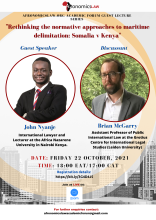The Role of the State in Managing Crossborder Flows and the Politics of Crossborder Capital Management Tools
The heightened movement of financial capital across the globe, particularly since the 2008 financial crisis, has breathed new life into three long-standing, yet until recently side-lined, debates: the value of cross-border capital controls (increasingly discussed under the banner of ‘macroprudentialism’); dependency theory (key elements of which manifest in the emerging literature on ‘subordinate financialization’); and the role of the state in a capitalist system (discussed in various critical political economy literature, including the influential critical macro-finance scholarship). Alami’s book Money, Power, and Financial Capital in Emerging Markets: Facing the Liquidity Tsunami is a critical intervention into all three debates and serves as fertile ground for a critique of the capitalist state in a highly financialized global system.
